What makes Indian farmers kill themselves?
- Published
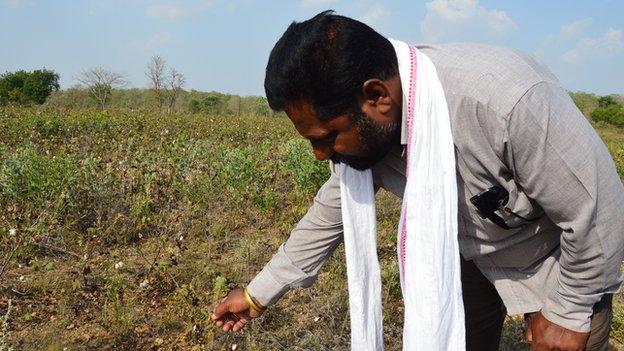
"There is no future in farming," says Bhaskar Deovalvar
In February this year Ram Rao Narayan Panchlenvar tried to poison himself.
After rain destroyed his cotton crop, he lost hope of earning anything from his farm in the western state of Maharashtra.
It was the third year in a row his crops had failed - first due to a year of drought and then two years of untimely rain.
And with debts of $35,000 (£22,600) - money borrowed for his farm and to pay for his daughter's wedding - Mr Panchlenvar has no idea how he will get back on his feet.
Now he picks the little cotton that wasn't ravaged by weather, desperately hoping the authorities can support farmers like him.
''The government should waive the loans for farmers. The compensation we are getting right now should be trebled.
"Only then will it help us. Even the minimum support price for our crops is very low. I have to sell - at whatever price the government offers. ''
At least though, his bid to kill himself failed. Others have been less lucky.
'There is nothing left in my life'
In the past 20 years, nearly 300,000 farmers have committed suicide, says India's National Crime Records Bureau.
Unseasonal rainfall and hailstorms in many parts of India in recent weeks have destroyed crops, putting further strain on impoverished farmers and driving many of them to kill themselves.
In the first four months of this year alone, 257 farmers in Maharashtra have taken their own lives, according to the state government.
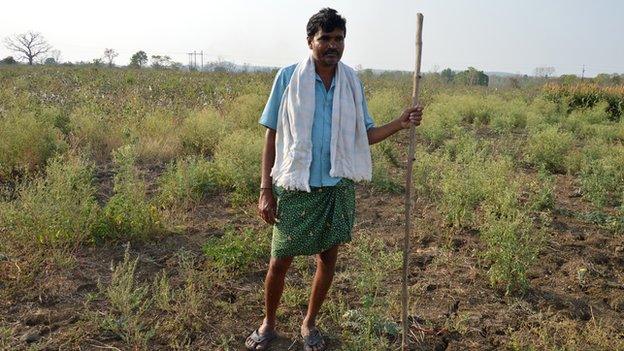
After his crops failed for a third year in a row, Ram Rao Narayan Panchlenvar tried to kill himself
A few kilometres away in the next village, Janabai Ghodam knows the pain first-hand.
Her husband Ramesh Ghodam killed himself two months ago because he was overcome by worries about money, she says. He had racked up debts of about $3,000. And his crop too, had failed.
Now Mrs Ghodam says she is surviving by taking casual work on other farms when she can find it.
"There is nothing left in my life. The crops are destroyed on the farm, it is all empty land and I can't sow new seeds this season. There's hardly any food at home to cook. I am left alone with my daughter and son."
Mrs Ghodam's home is dark. She could not pay electricity bills for the last two months and the power has been cut off. And there is no money left for her 20-year-old daughter's wedding.
"There is very little we can do for her marriage. I don't have anything for her.''
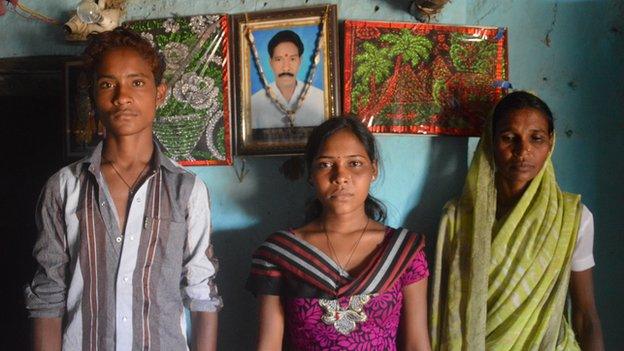
Janabai Ghodam and her two children: Her husband killed himself after building up debts of $3,000
Back in Mr Panchlenvar's village, a group of farmers discuss the future. Cotton is the main crop here but because global prices have slumped and demand from China is plunging, the prospects are bleak.
They have little choice but to accept prices offered by the government and mill owners.
One farmer in the group, Bhaskar Deovalvar explains that the entire village relies on farming. Most are in debt to local money lenders who charge interest rates of 25%.
His hopes now lie in his younger son who is studying science in a college about 20km away. Mr Deovalvar prays he'll get a job in the city after graduating.
"There is no future in farming, it is a lot of investment but no returns," he says.
"With no productivity from the farms and constant pressure from banks and money lenders there is no option left for farmers but to kill themselves."
'Deep-rooted problem'
The country's Prime Minister, Narendra Modi, who completes his first year in office on 26 May, recently said that "for several years, farmers' suicide has been a cause of worry for the nation".
He added: "The problem is old, deep-rooted and widespread and we have to seek solutions in that context.
"There should be a collective resolve in this regard. We have an open mind to consider any suggestion that is made."
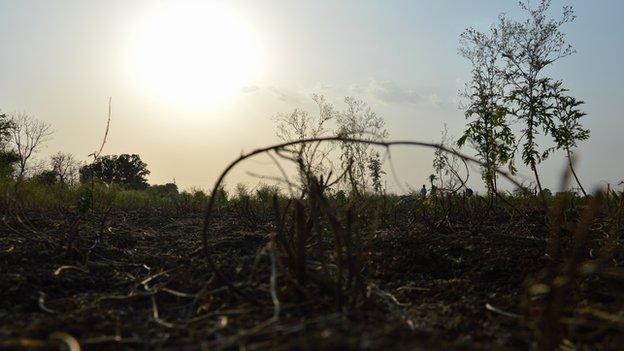
Maharashtra's government says water conservation measures have not worked
The Maharashtra state government says that is trying to help farmers and their families - including concessions on electricity bills and covering the interest payments on loans.
But it admits another scheme aimed at trying to prevent drought by conserving water is not working.
''In Maharashtra, water conservation was being done at various levels by different departments such as agriculture, water conservation, soil conservation, forest, social forestry and irrigation," the state Chief Minister Devendra Fadnavis told the BBC.
"But proper coordination was sorely lacking. One department did not know what the other departments were doing. It aggravated the issue."
The state also pays compensation worth about $1,500 to families which are struggling after a farmer has committed suicide.
Mental health issue
But community work tackling the issues around suicide should be the priority rather than handouts, argues Dr Vikram Patel, a psychiatrist and professor at the London School of Hygiene and Tropical Medicine.
Dr Patel, who is leading a community programme in the region for villagers suffering from depression, wants suicide to be seen as a public health issue.
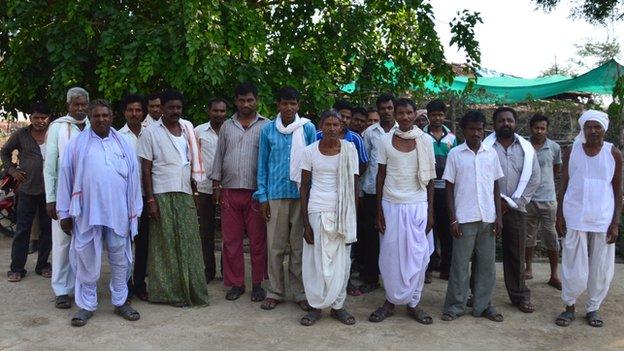
Cotton is the main crop in Maharashtra, but global prices have slumped and demand from China is plunging
"It is absurd in our country and I think we are probably the only country in the world where the government compensates people if someone in the family kills themselves.
"In India we haven't done good research on farmers' suicides and in terms of mental health, this has always been seen as a social issue.
"But if you look around the world at least 50% of farmers, and adults who kill themselves would have had a depressive disorder or an alcohol use disorder, these two being the main mental health conditions."
Some fresh thought on a long-standing issue could be welcome here in Vidarbha. It is too late for Ramesh Ghodam's family - but perhaps the first steps in breaking the cycle of desperation and misery that so many Indian farming communities face.